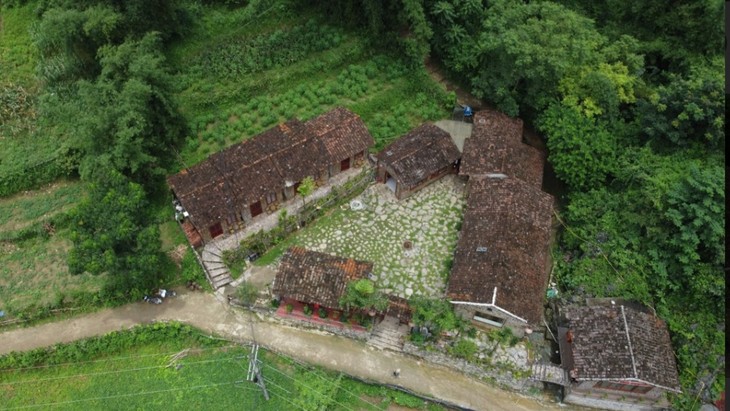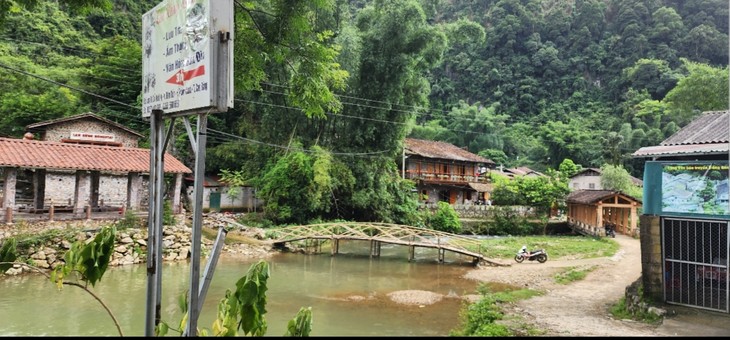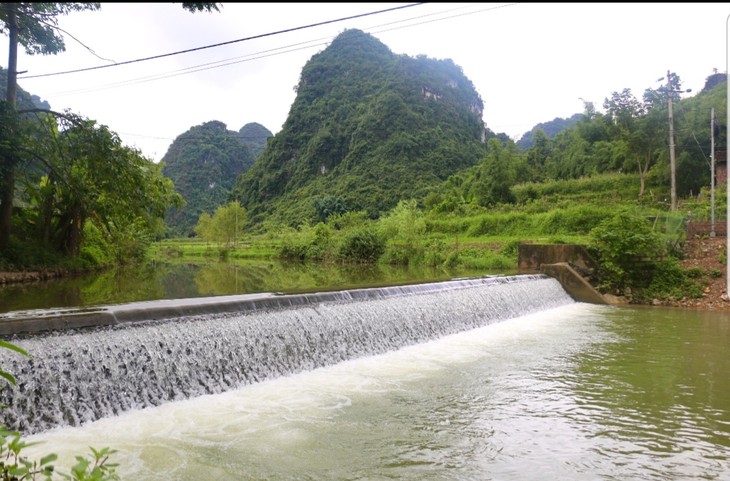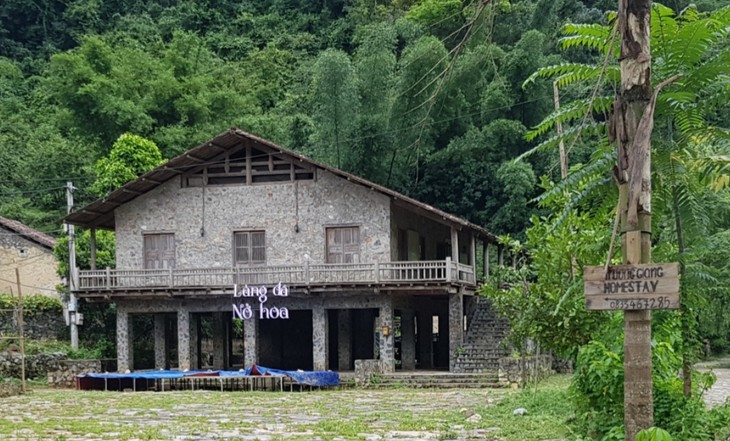Located on the border between Vietnam and China, Khuoi Ky village in Dam Thuy commune, Cao Bang province, has a long history of more than 400 years. It’s an eco-tourism village and one of the most popular tourist destinations in Trung Khanh district.

Khuoi Ky village seen from above (Photo: Ngoc Anh)
Home to 100 Tay ethnic minority families, Khuoi Ky village is surrounded by mountains and forests.
In the Tay language, Khuoi Ky means ‘small stream’, a reference to the stream that flows through the village. Khuoi Ky village has a unique beauty with houses built of stone and roofed with yin-yang tiles. The road leading to the village is paved with cobblestones. The fences separating the houses are made of elaborately stacked stones.
In the Tay belief, mountain stones represent their God, who has the power to protect them and bless them with a peaceful life.
Nguyen Kim Phuong, the owner of Tay’s Homestay, said, “The unique feature of Khuoi Ky village is its stone houses, particularly the stone stilt houses covered with yin and yang roofs that other localities don’t have.
Khuoi Ky has another advantage for tourism development - it’s located 2 kilometers from Ban Gioc waterfall and 800 meters from Nguom Ngao cave. In recent years, Khuoi Ky village has been attracting crowds of tourists. On the weekends, the village is full of tourists and the rooms are fully booked.”

A corner of Khuoi Ky village (Photo: Ngoc Anh)
Since 2009 the local Department of Culture, Sports and Tourism has invested in making Khuoi Ky village a Tay ethnic cultural and tourism village.
Luong Van La, head of the Culture and Information Section of Trung Khanh district, said, “Since 2016 households in Khuoi Ky village have deployed the homestay services model to develop community-based tourism and boost local incomes. The Tay cultural village project in Khuoi Ky has attracted 17 households offering homestay services.
Khuoi Ky’s tourism products are closely linked with the Tay culture. The project has become a highlight of community-based tourism development in Cao Bang province.”

Khuoi Ky stream (Photo: Ngoc Anh)
Three of the 17 homestays in Khuoi Ky village are new and combine traditional and modern architecture.
Hoang Thi Khanh, the owner of the Forest Orchid Homestay, said, “My homestay was built more than a year ago. Reflecting the local culture, it was built of stone. To cater to the customers, we built smaller private bedrooms instead of a large dormitory room. My homestay has 9 rooms and can accommodate up to 34 guests. The foreign tourists are mostly French, Dutch, American, or Spanish.”
From September to November and after the Lunar New Year are the peak seasons for tourism in Khuoi Ky village. Tourists enjoy the majestic mountains, the peaceful ancient village, and the fresh, cool air.
Tran Minh Khue, a visitor from Hanoi, told that he has travelled to many places, but he was surprised by the unique architecture of Khuoi Ky’s stone houses.
“The architecture blends traditional and modern features. The stream cools the atmosphere and provides a beautiful backdrop for photos. This place is great for either relaxation or exploration. If I have an opportunity to return to Cao Bang province, I’ll definitely come to Khuoi Ky village again,” said Khue.
Khuoi Ky offers a variety of tourism services - Tay ethnic cuisine and craft items, Tính musical instrument, bamboo dancing, and Then singing, a UNESCO-recognized Intangible Cultural Heritage of Humanity.

A homestay in Khuoi Ky village (Photo: Ngoc Anh)
Tourists, especially foreign tourists, love to hike in the mountains, collect firewood, build campfires, transplant rice seedlings, and catch fish from the stream with the local people.
Redouane Mahi, a French tourist in Khuoi Ky for the first time, said, “I stayed in the Tay ethnic village and had a wonderful night. The Internet makes exchanging information between tourists and locals very easy. The villagers are friendly and hospitable and good at doing tourism.”
In 2008, Khuoi Ky was recognized by the Ministry of Culture, Sports and Tourism as a typical traditional ethnic minority cultural village.
Ngoc Anh